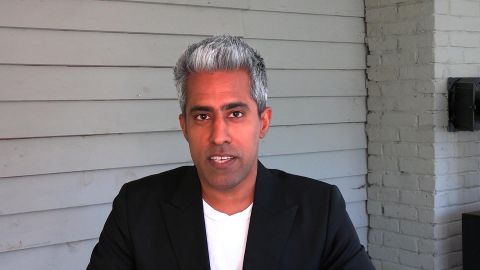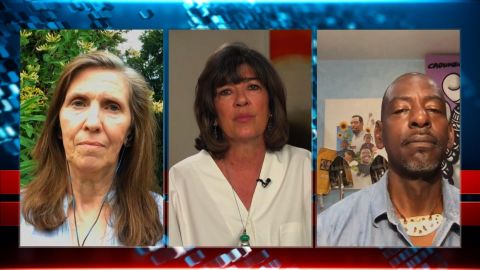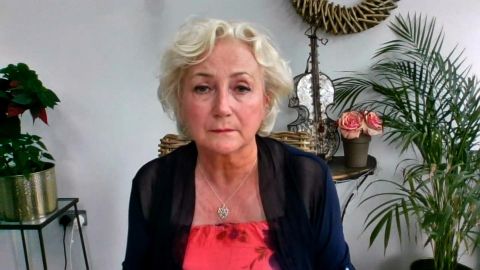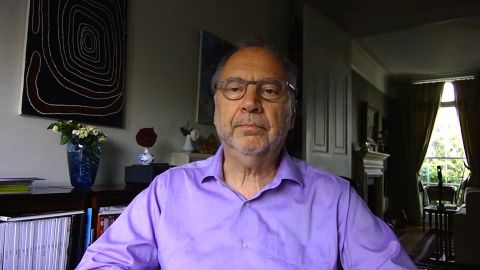Read Transcript EXPAND
CHRISTIANE AMANPOUR: But first, this pandemic has prompted a lot of us to reflect on how the world works and importantly, who it works for. That’s at the heart of a new program called “Seat At The Table” on Vice TV, from writer and best-selling author, Anand Giridharadas. He has made a career of questioning the seat of power and money in American. And now, he tells our Hari Sreenivasan why our society really needs to adapt or fail.
HARI SREENIVASAN: Thanks, Christiane. Anand, thanks for joining me. This entire period seems like a strange time to start an entirely new television program. But what has been revelatory for you? What are you talking with your guests about?
ANAND GIRIDHARADAS, HOST, VICE TV’s “SEAT AT THE TABLE”: It’s interesting. We conceived of seat at the table and set it up right before we realized what was going to happen with the pandemic. So, we had a complete briefly sketched plan for a normal world TV show. And the idea in that phase was thinking about power, thinking about the fact that the central issue in American life, in my view, is the imbalance of power, the concentration of power, power allied with wealth, and that that was often reflected in what you see in a lot of cable news, the kind of interests of power, the ideas of power reflected more than those of the powerless. And we wondered if we could change that. Then the pandemic struck. So there was a logistical element of that. Suddenly, we’re all dispersed. Everybody’s on Zoom and figuring out, can you make a TV show when everybody’s separate on Zoom? Turns out you actually can, thanks to the remarkable technologies you have in this time. But, actually, the mission didn’t have to change at all, because I think the thesis about power was amplified by the pandemic, rather than changed. You know, we often say the pandemic is unprecedented. It’s not unprecedented. It’s a building on the mega-trends of the last 30 or 40 years, including the growing consolidation of power. And another thing we say is, we’re all in it together. We are not all in it together. We haven’t been. And we’re not all in it together in the pandemic. And so those have become the issues we’re digging into even more deeply, trying to understand why the pandemic has unfolded the way it has in America, which is different from South Korea, different from Germany, as you know, different from all kinds of other places. The virus wasn’t a product of plutocracy and oligarchy in America, but the way in which the virus has affected us is very much a product of those social conditions.
HARI SREENIVASAN: When you say, we’re not all in this together, you mean, what, that we’re all impacted differently, the that’s how it’s separate for us?
GIRIDHARADAS: In many ways. First of all, just in terms of who is dying from this plague, in many parts of this country, it is literally a black plague. It is a plague that is killing African-Americans at substantially higher rates than other communities. And that is for a whole host of reasons, including the health access people have, including doctors not listening to people, and so on and so forth. So we’re not all in it together in terms of who is living and who is dying. But we’re also not in it together in terms of everybody else who doesn’t have the thing, but is affected by the economic and social upheaval that this is. You know, who gets to be someone who works from home? That is not evenly distributed either. If you look at even racially, the fraction of white people who have a job that allows them to continue working from home vs. the fraction of blacks and Latinos who can do that is just really, really different. And if you look at the precarity of employment in the last many years, the increasing precarity, the rise of the gig economy, Uber drivers are kind of all of us, as Silicon Valley has deepened its hold on the economy and you have this notion of people, you know, being contracted out to work through apps that actually often steal some of their money and steal their tips. Well, you know, we have now realized that employing millions of people in this precarious way results in massive social calamities that are a choice, right? The virus isn’t a choice, but to have tens of millions of people with instantly no security, no savings out on the street, so to speak, is a product of social choices we have made that other societies chose more wisely to do differently.
SREENIVASAN: When you talk about choice, there’s also — one of the segments on your program recently was called, I think, the war on government. There’s a pretty sizable movement among supporters of the president that seems pro-freedom. It also seems anti-government. We recently had the author and professor Tom Nichols on. And he said, you know what? That kind of freedom is confused with the type of freedom that children have. But you also went on in your program and talked about how there is a certain tyranny in life with no government at all. Explain that?
GIRIDHARADAS: You know, many Americans have a childlike understanding of freedom, as you say. And what that consists of is an understanding of freedom, which in many ways goes back to our founding, a freedom obsession, I would say, these Americans have, in which freedom is defined as the absence of government. Now — or government doing as little as possible, a government leaving you alone. Now, I would be the first to say that is an element of freedom. There’s a whole bunch of things, right, that I don’t want the government intervening in my life. And I share that. I think everyone listening to this would share that. But, for a great number of Americans with this infantile understanding of freedom, that is it. That is freedom. Freedom is being left alone by government. And it’s being paranoid about government being way more interested in you than you are actually interesting, right? Government is coming for your guns. Government is coming to regulate your food away. Government is coming to tell you who you can meet. Government is coming to manipulate you through its allies in the fake news, this kind of paranoid attitude, government coming to get you. And the point we made on the segment was, what this has done is obscure the way in which a large aspect of human freedom is actually not threatened by government, but by private actors, right? A bank screwing you over, speculating in ways that lead to you losing your home is also a threat to your freedom. It doesn’t mean government is not a threat to your freedom, but the threat can also come from over there, right? A company dumping toxic chemicals into the creek where your kids play, right, is also threatening your freedom and their freedom, but it’s not government. And what we have often failed to understand as a culture, and certainly these members of Americans who feel this way, is that, when the threats actually come from private actors, your best bet against those kinds of threats are the government. If you are hungry because you’re paid seven bucks an hour, instead of 15, the government is your best bet to make sure you get paid 15. There’s not another easy way to make that happen. And so this childlike freedom obsession that tens of millions of Americans, unfortunately, have is literally killing us in this pandemic, because they are so focused on government oppressing them through lockdowns that they don’t understand that you can end up way more oppressed by a virus, you can end up way more oppressed by not having economic security. You can end up way more oppressed by having the kind of health care system that encourages people to stay home, instead of get tested.
SREENIVASAN: Right now, we are in an unprecedented time of government spending. We have passed literally trillions of dollars out the door. Has the government stepped up to help with this stimulus package?
GIRIDHARADAS: The stimulus is not only a question of amounts, but about how wisely you disburse the money. So, you can have stimulus that is cornered by big business, as happened with the Paycheck Protection Program, or you can have stimulus that really goes to regular people. I mean, I have been seeing stories across Europe where freelancers just suddenly woke up to money being deposited into their accounts by the government, because it recognized that freelancers would need it in this time, right? That’s just a — our society could work that way. We just choose to have it not work that way. And then there’s this notion of conditionalities. Economist Mariana Mazzucato talks about this. It’s the notion that if you’re going to be giving companies a lot of money when they’re desperate, they’re on their knees begging for the government’s money, this is an extraordinary time to ask them for a couple of things. Right? Normally, in the absence of a crisis, companies have a lot of power and they have got these lobbyists, and it’s hard to get regulatory things done on them. Well, when you’re begging, it’s a good time to ask for what you want. So, you do conditionalities. Conditionalities are, OK, you want this paycheck protection plan, you want this kind of bailout of whatever, we would like you to institute these environmental protections. We would like you to not spend money in politics. We would like you to pay your workers this much. We would like you to commit to these kinds of retraining programs after the pandemic. People — like, you can ask companies for what you want. That’s kind of the whole idea, because taking the money, they don’t have to do it, right? It’s actually your money to — you are giving companies money, which may be a shock, if you don’t have a lot of money, that you’re actually giving companies money, but you are. And so if you’re giving companies money, like the airlines, it’s time to ask for some things you want. You know what? I don’t like those overhead charges. I don’t like the fact that you bust the unions of the flight attendants. I don’t like the fact that I can’t change my ticket when I have a problem in my family without spending $500. And you just say to the airlines, you want this bailout money? Here’s what we want, the people who are giving you this money. It’s a very basic concept that should be understandable to anyone who’s ever watched a mafia movie. But somehow this idea of conditionalities hasn’t really dawned on the United States Congress. And it’s very, very important that it does in any future relief.
SREENIVASAN: This is also an era where we’re seeing largess by billionaires. And you have written about this extensively for your book “Winners Take All.” When you look out at press releases, proclamations, initiatives funded by billionaires, what goes through your mind?
GIRIDHARADAS: You know, the virus, again, has only amplified what we have been seeing for the last many years, which is, some of the richest and most powerful people, you know, stepping up with these pledges of lavish help. But I think one of the things I found from missing from a lot of this conversation that I have been trying to articulate is that this very billionaire class that is stepping up to help in the pandemic is in many ways responsible for why the pandemic unfolded in the way it has in America.
SREENIVASAN: Explain that.
GIRIDHARADAS: So, if you look at why government has been discredited, intellectually discredited, defunded, defanged from a regulatory point of view, why do we shut down preventative offices, for example? Who does that? Working people? Is there working people advocating for dismantling government? It is very much a product of corporate interest lobbying in Washington, sometimes succeeding under Democratic administrations, more often succeeding under Republican administrations, to yank out regulation, cut funding, cut taxes, so the government can do less. Right? The way the pandemic has unfolded in America is inseparable from that discrediting, defanging and defunding of government. So, when I see the very same class of people stepping up, I see arsonists returning to the scene of a fire and putting on a costume and claiming to be firefighters. In many ways, what they are doing is trying to buy mercy on the cheap, so we don’t actually fix this society in a way that reduces their power and makes us not so vulnerable the next time a pandemic like this or something else rolls around.
SREENIVASAN: I can hear a CEO or someone who’s justifying the market saying, they’re just responding to shareholders. They are acting in their rational self-interest, as stewards of specific companies, that we don’t necessarily have a system right now that rewards excess capacity in hospitals or having extra masks on hand. How do you change that?
GIRIDHARADAS: Many ways. But, first of all, if we — you are right about one thing very important right here, which is, if we want companies that take care of the commons, we should change corporate law to require stakeholder capitalism, right? The Business Roundtable, big lobbying group for the biggest companies, last year claimed to do a big deal statement where they said, the purpose of business is no longer just to make money for shareholders, but to account for all stakeholders. Unfortunately — and I confronted Jamie Dimon about this when he reached out to me to address my skepticism of this, and I said, you know, Jamie, why don’t you — there are legislative policies, proposals out there to take this statement and make it the law. Elizabeth Warren had one, where it would be the law of the land for companies of a certain size to take stakeholders. Jamie, this is perfect for you. You said you want this in a statement. You have got Elizabeth Warren, who wants to take your statement and do the ultimate retweet of it, which is put it into the law. Oh, no, no, no, no, no, no. No, that — no, no, no, we don’t want to — we wouldn’t want to be a police force. These people are not serious. Jamie Dimon is not serious. There’s not a seriousness around actually having this be how capitalism works. So, they want the moral glow of voluntary virtue, but they don’t actually want it to be a rule that companies have to — you know, can’t hurt workers, hurt communities, hurt the planet in order to make money. So, if you really want companies behaving that way, you got to change the law. Number two, there’s a bunch of smaller regulations along the way that are not as big as just the underlying corporate law that actually help people make those decisions in better ways. If you’re paying people 15 or 20 bucks an hour as your minimum, you’re just not going to have as many billionaires having as many billions, right? You’re not going to have the kind of outsized leverage that big companies have, if you have way more working people with way more disposable income contributing to political campaigns, as they have been in recent years. We have, in every phase of American life, designed a system that is almost bespoke tailored to serve rich people’s interests. And the wakeup call is, it doesn’t have to be like this. So many other countries are not like this, and they still have capitalism. This is what’s so shocking to Americans. Do you know that Germany has capitalism? Do you know that all the Scandinavian companies have capitalism — countries have capitalism? They have great companies there, right? Do you know that those countries with universal health care, you talk to business people there, they love having universal health care. You know why? Because they don’t have to pay for it. Their companies, they don’t have to actually think about it. When they’re starting a small business, they don’t have to have this huge expense of paying for people, right? When they’re trying to recruit people to their small businesses, they don’t have to deal with this problem of people not wanting to leave a big company because they’re going to lose their health care. It is actually better to live in a decent society. And when Americans start to wake up to that in greater numbers, it’s going to be a great day.
SREENIVASAN: The new show is called “Seat at the Table” on VICE TV. Anand Giridharadas, thanks so much for joining us.
GIRIDHARADAS: Thank you for having me.
About This Episode EXPAND
Peter Piot is one of the world’s leading epidemiologists who co-discovered Ebola back in 1976. More than 40 years later, he was nearly felled by COVID-19–a gruelling experience from which he is still in recovery. He explains what he learned.
LEARN MORE



